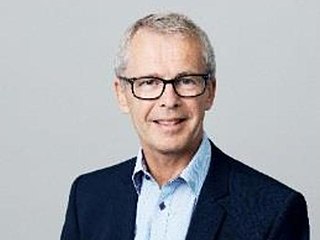
A home, or domicile, is a space used as a permanent or semi-permanent residence for one or more human occupants, and sometimes various companion animals. It is a fully- or semi-sheltered space and can have both interior and exterior aspects to it. Homes provide sheltered spaces, for instance rooms, where domestic activity can be performed such as sleeping, preparing food, eating and hygiene as well as providing spaces for work and leisure such as remote working, studying and playing.

Aalborg University (AAU) is an international public university with campuses in Aalborg, Esbjerg, and Copenhagen, Denmark. Founded in 1974, the university awards bachelor's degrees, master's degrees, and PhD degrees in a wide variety of subjects within humanities, social sciences, information technology, design, engineering, exact sciences, and medicine.
The Social Democrats is a social democratic political party in Denmark. A member of the Party of European Socialists (PES), the Social Democrats have 50 out of 179 members of the Danish parliament, Folketing, and three out of fourteen MEPs elected from Denmark.

A sustainable city, eco-city, or green city is a city designed with consideration for social, economic, environmental impact, and resilient habitat for existing populations, without compromising the ability of future generations to experience the same. The UN Sustainable Development Goal 11 defines sustainable cities as those that are dedicated to achieving green sustainability, social sustainability and economic sustainability. They are committed to doing so by enabling opportunities for all through a design focused on inclusivity as well as maintaining a sustainable economic growth. The focus will also includes minimizing required inputs of energy, water, and food, and drastically reducing waste, output of heat, air pollution – CO2, methane, and water pollution. Richard Register, a visual artist, first coined the term ecocity in his 1987 book Ecocity Berkeley: Building Cities for a Healthy Future, where he offers innovative city planning solutions that would work anywhere. Other leading figures who envisioned sustainable cities are architect Paul F Downton, who later founded the company Ecopolis Pty Ltd, as well as authors Timothy Beatley and Steffen Lehmann, who have written extensively on the subject. The field of industrial ecology is sometimes used in planning these cities.
The Great Belt power link, also known as the Great Belt electricity link, is a high-voltage direct-current interconnection across the Great Belt between Funen and Zealand connecting two power transmission systems in Denmark.

Mette Frederiksen is a Danish politician who has served as prime minister of Denmark since June 2019, and leader of the Social Democrats since June 2015. The second woman to hold either office, she is also the youngest prime minister in Danish history, the first to be born after Margrethe II's accession to the throne, and the first to serve under Frederik X.
Denmark imports but does not produce nuclear energy, which is in accordance with a 1985 law passed by the Danish parliament, prohibiting power production from nuclear energy in Denmark. In 2014 and 2015, (imported) nuclear power was 3-4% of electricity consumption in Denmark.

Kirsten Brosbøl is a Danish politician. She represented the Social Democrats in the Folketing from 2005 to 2019, and served as Minister for the Environment from 2014 to 2015.
Remus Teodorescu (02.06.1965) is a professor of Energy Technology at Aalborg University. He holds a degree from 1989 in electrical engineering from the Politehnica University of Bucharest in Romania. In 1994 he received a Ph.D. degree in power electronics from the University of Galati in Romania.
Gunhild Moltesen Agger is a professor in Danish media history at Aalborg University. She conducts research in media science, focusing on Danish television drama and film, crime fiction and national identity in a globalized world.

Lars Gunnarsen is a Danish professor in construction at Aalborg University where he conducts research in indoor climate and ventilation.
Anette Borchorst is a Danish professor of both Political Gender Research at CCWS Center for Comparative Welfare Studies and the Center for Labor Market Research (CARMA), the Department of Political Science at Aalborg University. Also, she is Head of the Department of Political Science at Aalborg University.
Malene Freudendal-Pedersen is professor of urban planning at Aalborg University and has an interdisciplinary background linking sociology, geography, urban planning and the sociology of technology. Her research has been strongly inspired by the mobilities turn.
Anja Jørgensen is a Danish professor of urban sociology at Aalborg University.
Ann-Dorte Christensen is a Danish professor at the Department of Sociology and Social Work at Aalborg University.

Theresa Birgitta Brønnum Scavenius is a Danish politician who currently serves as an independent member of the Folketing. Previously a member of the green political party The Alternative, she was first elected at the 2022 Danish general election as a member of the party, having previously run unsuccessfully for them in the 2019 election. She was a candidate to succeed Uffe Elbæk as leader of the party, after he resigned in February 2020, but lost to Josephine Fock.
Birte Siim is a Danish political scientist specializing in gender studies. From 2004 to 2018, she was professor at the Institute for Culture and Global Studies at Aalborg University where she managed FREIA, the Centre of Gender Research. Her numerous books and publications have addressed gender and politics from a European perspective. In addition to coordinating European Union projects, she has been active in the ECPR Standing Group on Gender and Politics.
Birgitte Bak-Jensen is a Danish professor and researcher at the Department of Energy Technology at Aalborg University. Her research is aimed at intelligent energy systems and active electrical grids.

Sarah Pink is a British-born social scientist, ethnographer and social anthropologist, now based in Australia, known for her work using visual research methods such as photography, images, video and other media for ethnographic research in digital media and new technologies. She has an international reputation for her work in visual ethnography and her book Doing Visual Ethnography, first published in 2001 and now in its 4th edition, is used in anthropology, sociology, cultural studies, photographic studies and media studies. She has designed or undertaken ethnographic research in UK, Spain, Australia, Sweden, Brazil and Indonesia.

Thomas Sinkjær R is a Danish scientist and professor of neuroscience and technology at the Department of Health Science and Technology of Aalborg University, Denmark. He is the Secretary General of the Royal Danish Academy of Sciences and Letters and an elected fellow of the Danish Academy of Technical Sciences.









